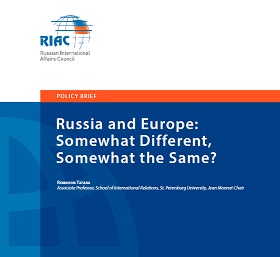Ever since the Eurasian Economic Union (EEU) was established in 2015, many Russian experts argue that stable cooperation between the EEU and the EU could be an efficient tool to improve the relations between Moscow and Brussels. Nevertheless, so far there have been very few contacts between officials of the European and Eurasian economic commissions. Nikolay Markotkin talked with Dr. Stefan Meister, Head of Program on Eastern Europe, Russia and Central Asia at the Robert Bosch Center, German Council on Foreign Relations (DGAP), who shared his opinion regarding the prospects of enhancing cooperation between the two unions.
Ever since the Eurasian Economic Union (EEU) was established in 2015, many Russian experts argue that stable cooperation between the EEU and the EU could be an efficient tool to improve the relations between Moscow and Brussels. Nevertheless, so far there have been very few contacts between officials of the European and Eurasian economic commissions. Nikolay Markotkin talked with Dr. Stefan Meister, Head of Program on Eastern Europe, Russia and Central Asia at the Robert Bosch Center, German Council on Foreign Relations (DGAP), who shared his opinion regarding the prospects of enhancing cooperation between the two unions.
In April 2016 President of Kazakhstan Nursultan Nazarbaev proposed organizing a joint forum between the EU and EEU. What is the position of European Commission officials regarding this initiative? Can it lead to a rapprochement between the two unions?
I think this is a question of how important the EC decisions and approaches of different member states are. I think what we are observing is a shift in the EU towards the growing importance of the member states rather than of the Commission. However, if you ask for the Commission, I think they are quite skeptical about an official EU-EEU summit. That reflects the perception of some member states and there is always the question about the recognition of Eurasian Economic Union as an equal partner to the European Union. There are a lot of contacts on a technical level, and there is also an approach to deepen these relations. But I think it is still has not been decided if it really brings benefits to recognize the Eurasian Economic Union, which is dominated by Russia because of its economic power and size compare to the other member states.
At the same time, we are having controversial discussions, and there are big EU member states which are arguing that the Eurasian Economic Union is an opportunity to reengage with Russia on an economic and political level. Especially since we have very few other areas at the moment where we really can define common interests. It is still not decided, but at the moment the tendency is “let’s try it” for some member states, including Germany. Nevertheless, there is no consensus on this issue and there are some member states which really disagree with this, which do not want to legitimize these institutions, including Russia’s role in them. I think this will block the EU-EEU relations in the foreseeable future.
During the latest Saint Petersburg Economic Forum, Chairman of the board of Eurasian Economic Commission Tigran Sargsyan for the first time briefly met President of European Commission Jean-Claude Juncker. How do you assess the likelihood of establishing stable contact between the two commissions?
I think it is not yet decided how to do this but there is increasing interest on the EU side to find institutions, platforms, areas where we can develop these contacts. There is also pressure on the European Commission from some member states to talk with Eurasian Economic Commission on a personal level and to have political meetings between the EU officials and EEU officials. So I think there is a tendency to use these institutions and some personal meetings to engage and have regular contacts, and send signals also to Russia that we are ready to engage. On a technical level it works but on the top political level, I think, there is a deficit of contacts. There are no more summits. I think that is the goal of some EU member states to use these platforms to reengage but there will be no compromises on issues like Ukraine. How stable these contacts are is linked question, if we can rebuild trust and if there is ground for cooperation and acceptance of some common rules.
Interviewed by Nikolai Markotkin, RIAC




